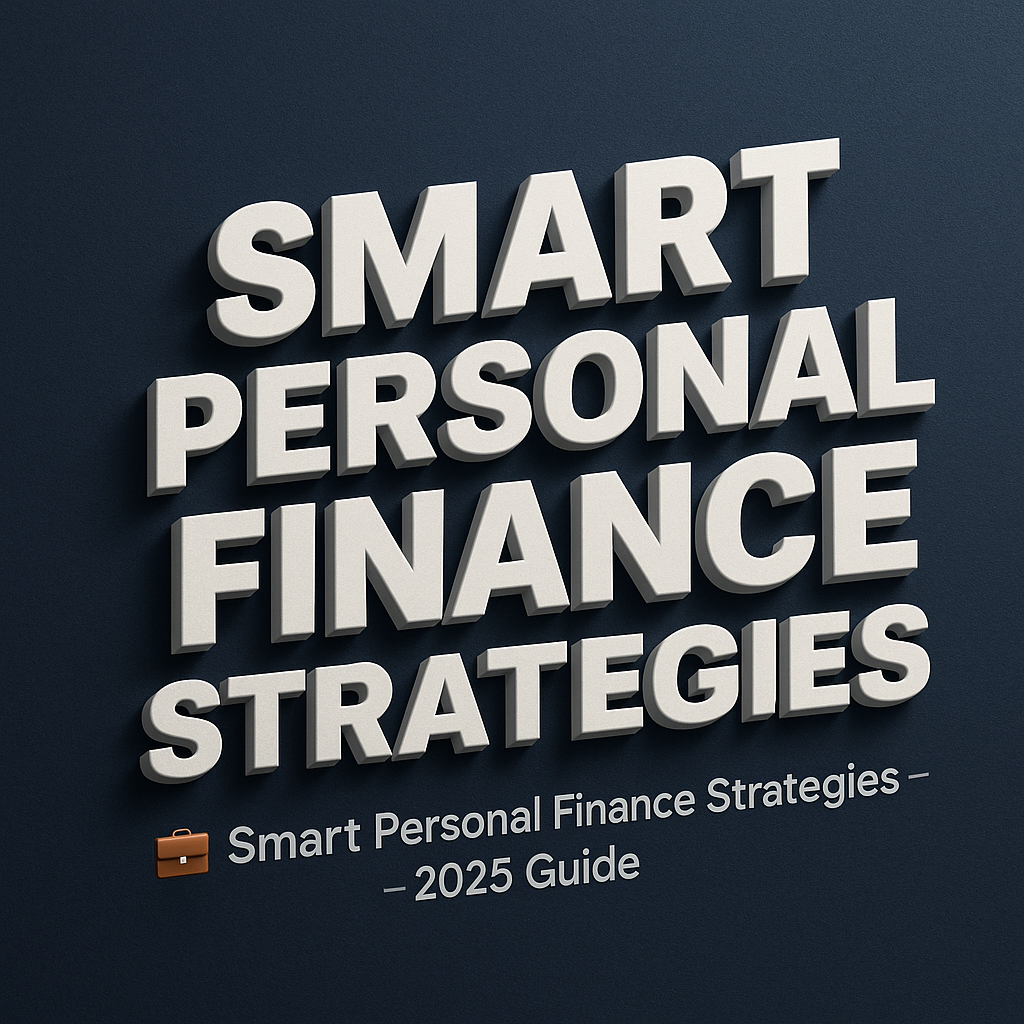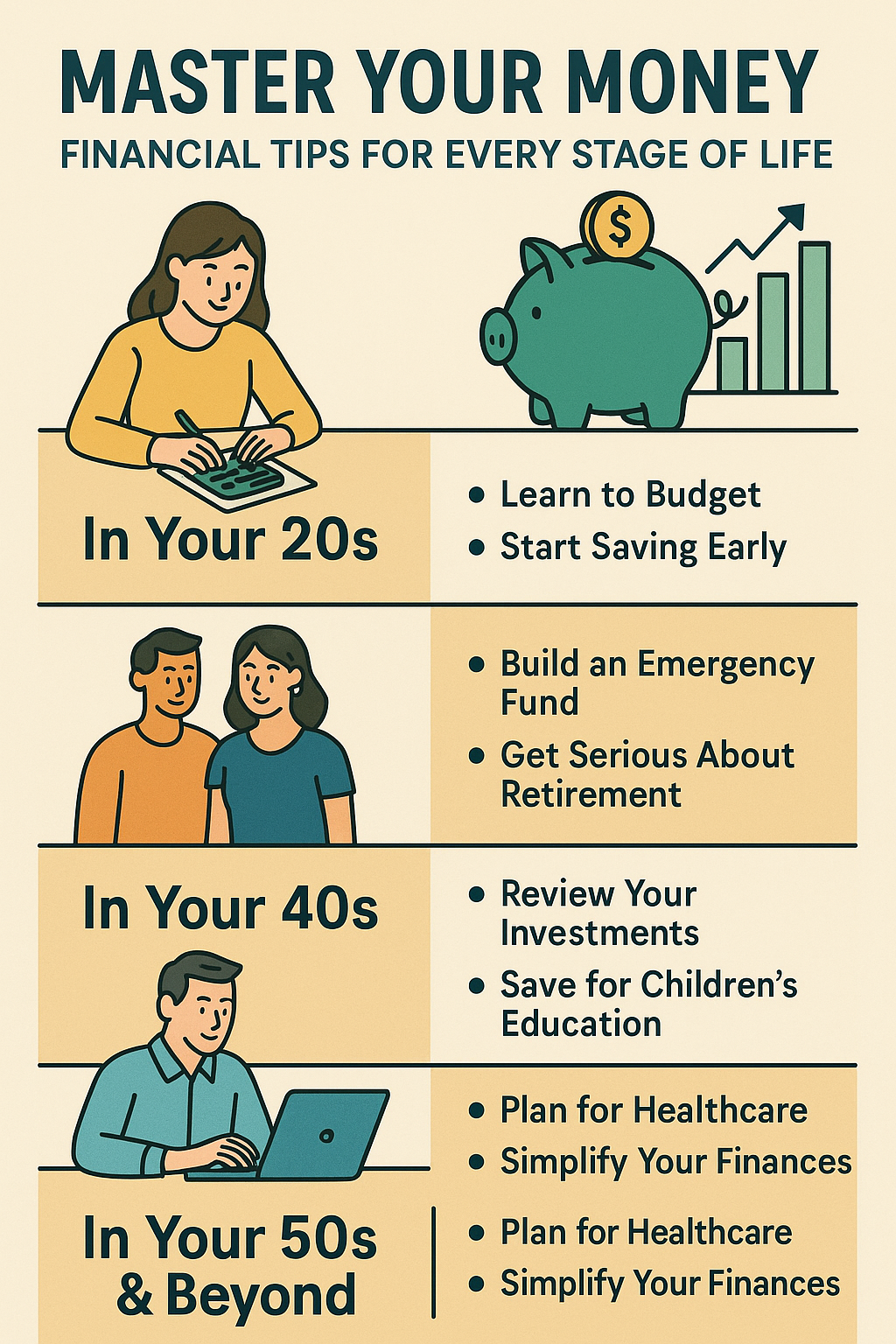Master Smart Personal Finance Strategies in 2025 to save more, invest wisely, and achieve financial freedom with practical, expert-backed tips.
As the financial landscape continues to evolve rapidly with changes in technology, inflation trends, global markets, and employment structures, the importance of having a dynamic and future-focused personal finance strategy has never been more critical. The year 2025 marks a turning point where old financial habits must give way to smarter, tech-driven, and adaptable strategies.
In this comprehensive guide, we explore smart personal finance strategies for 2025 and beyond that will help you build wealth, reduce financial stress, and navigate uncertain times with confidence.
Focus Keyword: Smart personal finance strategies
📌 Table of Contents
- Why 2025 Requires a New Approach to Personal Finance
- Budgeting in the Digital Age
- The Rise of Digital Banking and FinTech Tools
- How to Invest Smartly in 2025
- Saving Strategies That Outpace Inflation
- Debt Management in a High-Interest Economy
- Building Multiple Income Streams
- Preparing for Financial Emergencies and Uncertainties
- Retirement Planning for a Shifting Economy
- Sustainable Spending and Eco-Finance
- Financial Literacy in a Digital World
- Conclusion
Why 2025 Requires a New Approach to Personal Finance
The post-pandemic world, AI-powered workplaces, and volatile global markets mean your money needs to work smarter — not just harder. Traditional personal finance strategies are being disrupted by:
- Decentralized finance (DeFi)
- Variable inflation rates
- AI automation of jobs
- Gig economy expansion
That’s why adapting your personal finance approach to future-proof your wealth is more important than ever.
Budgeting in the Digital Age
Forget pen and paper — 2025 budgeting is about real-time tracking, AI insights, and automation.
🔧 Tools to Use:
- YNAB (You Need a Budget) – Zero-based budgeting with goal tracking
- Monarch Money – Real-time syncing with AI predictions
- Spendee & PocketGuard – For minimalist budget tracking
🧠 Pro Tip:
Use AI-enabled apps that analyze your spending and suggest changes — many now integrate with your bank account and categorize transactions automatically.
Focus Keyword Use: smart personal finance strategies, budgeting in 2025
The Rise of Digital Banking and FinTech Tools
Banks are no longer just places to hold money. In 2025, smart personal finance means choosing digital banks and FinTech apps that offer:
- Higher yields on savings
- Instant investing options
- No fees or foreign transaction charges
- Built-in credit monitoring
💳 Top Picks:
- Chime and Revolut for global-friendly accounts
- SoFi for hybrid saving, borrowing, and investing
- Ally Bank for high-yield online savings
Use FinTech not just to store money — but to grow it and protect it.
How to Invest Smartly in 2025
📈 Investment Strategies That Work Now:
- Diversification Is Non-Negotiable
Use ETFs, REITs, and mutual funds to spread risk. - AI-Guided Investing
Robo-advisors like Wealthfront and Betterment now use machine learning to auto-adjust your portfolio. - Sustainable & ESG Investing
Invest in companies that align with environmental, social, and governance values — not only ethical but also highly profitable. - Explore Blockchain and Digital Assets
Crypto is still volatile, but smart allocations (max 5%) can be part of a modern portfolio. Readmor: How to Start a Small Business with No Money: A Complete Guide (2025)
Saving Strategies That Outpace Inflation
High inflation eats savings. In 2025, the goal is to save smarter, not just more.
🏦 Where to Put Your Savings:
- High-Yield Savings Accounts – Look for APYs over 4%
- I-Bonds or Inflation-Protected Securities
- CD ladders that lock in higher rates for longer
🧠 Pro Tip:
Set up automatic savings transfers from each paycheck and treat savings as a non-negotiable expense.
Debt Management in a High-Interest Economy
Interest rates remain high. So debt elimination must be strategic and aggressive.
🚫 Bad Debt to Crush First:
- Credit cards
- Buy Now Pay Later (BNPL) accounts
- Personal loans with variable rates
✔️ Smart Debt Tactics:
- Use the Avalanche Method for highest-interest first
- Refinance student loans or mortgages only if fixed rates are low
- Consider debt consolidation for better terms
Building Multiple Income Streams
Job security is fading. Smart financial strategy in 2025 includes income diversification.
💡 Income Stream Ideas:
- Freelancing (graphic design, writing, coding)
- Online education or digital products
- Affiliate marketing and blogging
- Rental income or Airbnb
- Dividend investing
Don’t rely on one paycheck — build income pillars that support your lifestyle.
Preparing for Financial Emergencies and Uncertainties
If COVID-19 taught us anything, it’s that emergency funds are essential.
🛠️ How to Prepare:
- Save 6–12 months of expenses (not 3–6 anymore)
- Keep it liquid — savings or money market account
- Review insurance policies: health, life, disability, renters/homeowners
Build a financial moat around your life.
Retirement Planning for a Shifting Economy
You may live to 90+. Retirement savings in 2025 should reflect that longevity.
🔍 Key Tips:
- Max out 401(k) and IRA contributions
- Use catch-up contributions if over 50
- Consider HSA accounts for healthcare in retirement
- Track your retirement income gap — how much more you need per year
- Don’t rely solely on Social Security
Use online tools like Fidelity Retirement Score to assess your future readiness.
Sustainable Spending and Eco-Finance
Being eco-conscious is not just good for the planet — it can save you money, too.
🌱 Smart Eco-Spending Habits:
- Buy used or refurbished products
- Switch to energy-efficient appliances
- Use electric transport or hybrid models
- Reduce wasteful spending with minimalist budgeting
Look into ESG funds and green bonds for ethical investing that pays.
Financial Literacy in a Digital World
To apply any smart strategy, you must first understand the money game.
🎓 Resources to Learn:
- Books: The Psychology of Money, I Will Teach You to Be Rich
- Podcasts: Afford Anything, ChooseFI
- Online Courses: Coursera, Khan Academy, Udemy
🧠 Teach Your Kids Too:
- Use apps like Greenlight or GoHenry
- Teach budgeting, saving, and investing early
Financial literacy is a long-term investment with guaranteed returns.
Conclusion
In 2025 and beyond, smart personal finance strategies mean being proactive, not reactive. It’s about leveraging technology, diversifying income, and making data-driven decisions that secure your financial future.
The rules have changed, but the goal is the same: financial independence, peace of mind, and a life by design.
Don’t wait for a wake-up call — start now and build a financial plan that evolves with you.
✅ SEO Summary Checklist
Updated Sections with DoFollow Links
1. Create a Realistic Budget
Use tools like Mint or You Need A Budget (YNAB) to track income and expenses efficiently.
2. Build an Emergency Fund
Consider high-yield savings options like Ally Bank or Marcus by Goldman Sachs for your emergency fund.
4. Set Clear Financial Goals
You can use the SMART Goals Guide by MindTools to structure your financial objectives effectively.
6. Invest Wisely and Early
Explore beginner-friendly investing through platforms like Vanguard or Fidelity for diversified, low-cost funds.
7. Plan for Retirement Now
Use the AARP Retirement Calculator to estimate how much you’ll need for a secure retirement.
10. Stay Financially Educated
Read books like The Total Money Makeover by Dave Ramsey, or take free courses on Coursera and Khan Academy to enhance your financial literacy.


